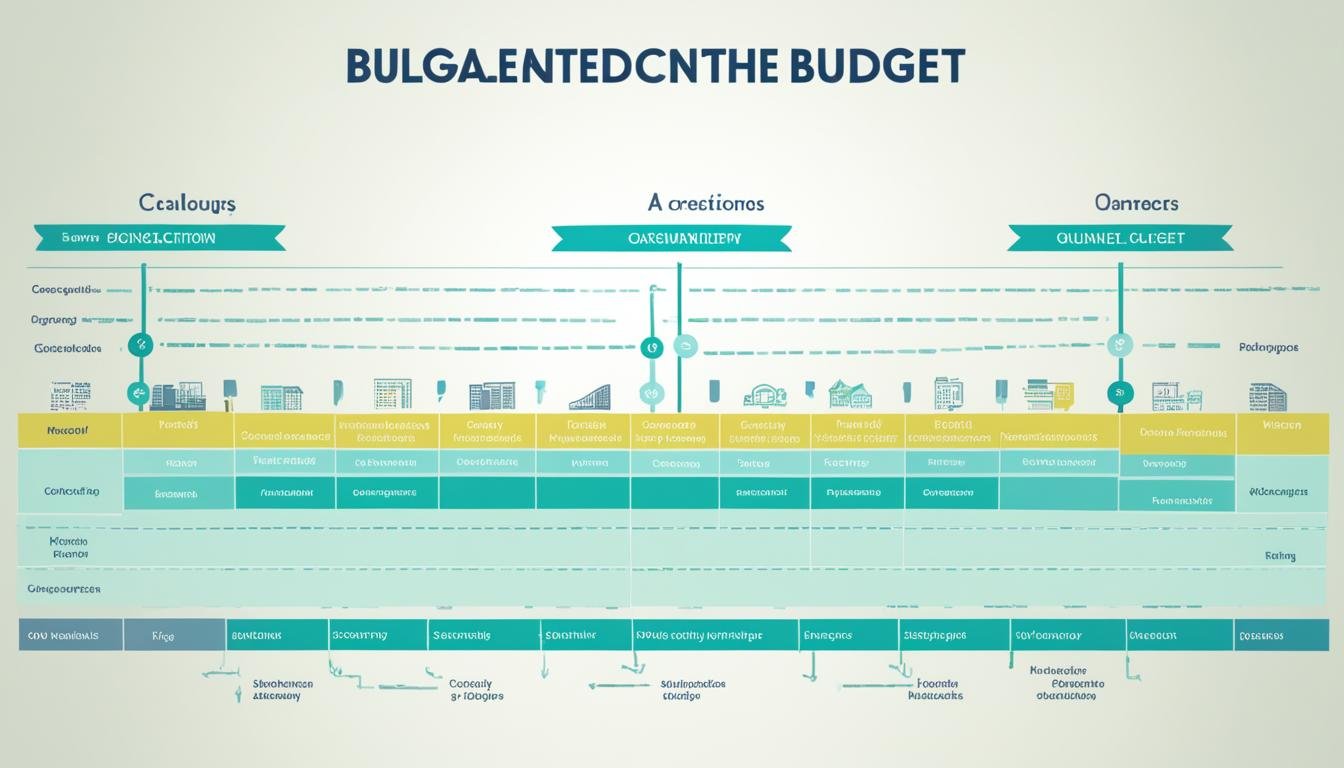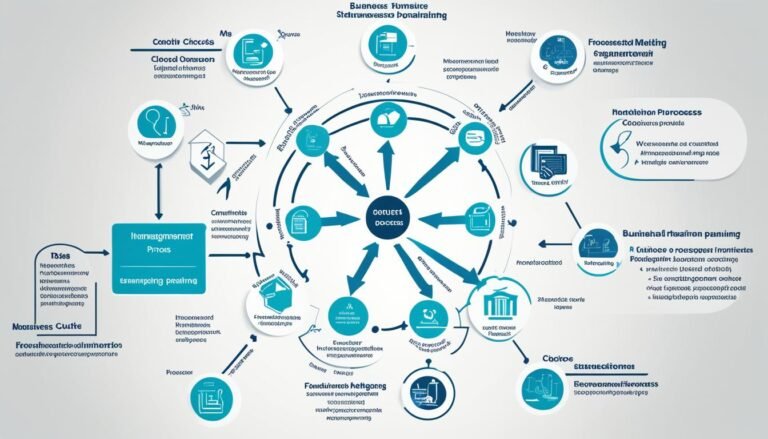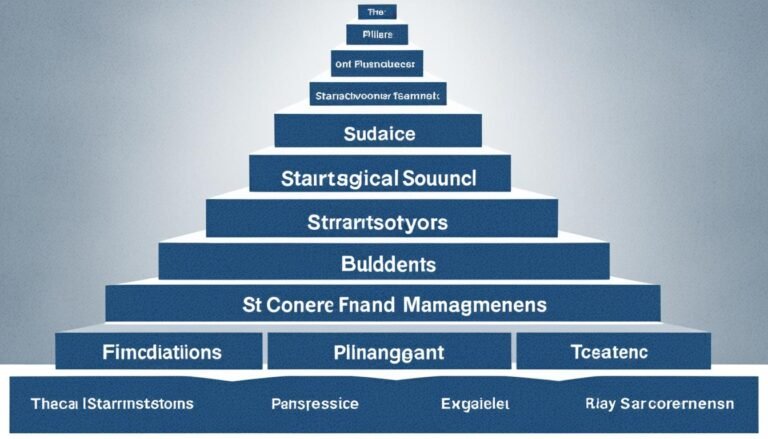What budget management techniques are most effective?
Ineffective budgeting can cause huge financial losses for companies. Forbes found that poor budget skills cost businesses about $150 billion yearly. To avoid being part of this figure, use effective budgeting.
Key Takeaways:
- Match your budget with your company’s goals to ensure spending helps achieve key outcomes.
- Use a budget that can change. This helps when things move, like if revenue goes up or down.
- Try zero-based budgeting. You start from zero and must prove every expense is needed. This helps cut waste.
- Use tools to make budgeting automated. It can save time, make things more accurate, and help teams work together better.
- Check and update your budget often as your company grows and changes.
These budget management techniques enhance your financial planning. They boost efficiency and move your business forward.
Align Your Budget with Your Strategy
It’s key to align your budget with what your organization wants to achieve. This step is vital for making the best use of your resources. By spending money in line with your goals and letting others know about this, you ensure your budget matches what you aim to do.
Having a budget that links well to your strategy lets you spend your money smartly. It makes sure that each dollar you spend helps your organization succeed. It focuses your efforts on growing, becoming more efficient, and sticking to your main goals.
Identify Key Performance Indicators (KPIs)
Choosing the right KPIs is crucial when matching your budget to your goals. KPIs are clear goals that show you’re moving toward your larger aims. They help keep you focused.
For instance, if you want to make customers happier, you might focus on their satisfaction scores. Spending money on efforts that lift this score means your budget is working for you.
Allocate Resources Based on Strategic Goals
After setting your KPIs, you need to put your money where it matters most. Look at which plans or projects will help you reach your goals. Then, give them the money they need.
Say, one of your goals is to grow in a new market. You’d then spend a lot on research, making new products, and marketing there. This way, your budget supports your top aims.
Communicate the Budget to Stakeholders
Telling others about your budget is as important as creating it. Talk to anyone who needs to know, like team leaders and top brass. This way, everyone gets how spending matches your plans.
Being open about your budget builds trust. It shows why you’re putting money in certain places. This openness helps teams unite behind the same goals.
Aligning your budget with your strategy leads you down a path to success. By focusing money on efforts to grow and perform better, you make sure every cent helps meet your goals.
Use a Flexible Budgeting Approach
Being flexible is crucial when budgeting. A flexible budget lets companies change their money plans if things change. This is different from a budget that stays the same. A flexible budget allows for changing plans if needed.
Companies can adjust budgets by looking at the real numbers. This can improve how they use their money. If they make more money than they thought, they can spend more in certain areas. But if they’re spending too much, they can cut back to save money.
This way of budgeting helps companies spot and fix problems early. They can keep an eye on how they’re doing versus their plan. This helps them make smarter choices and get better financial results.
“A flexible budget is a powerful tool that allows organizations to respond quickly and effectively to changing circumstances. It provides the agility needed to adapt and thrive in an ever-evolving business environment.”
To use a flexible budget, organizations should clearly define when to adjust the budget. This keeps decision-making in line with their goals. It means making changes when they need to, not when they want to.
Adaptable budgeting helps companies put money where it’s needed most. It encourages them to review and change their plans regularly. This keeps their money working in the best ways possible for the business.
In the end, being flexible with budgeting is key in today’s competitive world. It helps companies stay quick and ready for whatever comes. By being adaptable, they can make their money go further and stay ahead of the game.
Benefits of a Flexible Budgeting Approach:
- Improved financial performance
- Enhanced resource allocation
- Greater responsiveness to market changes
- Identification and correction of inefficiencies
- Proactive decision-making
| Static Budget | Flexible Budget |
|---|---|
| Predetermined figures that do not change | Allows adjustments based on actual results |
| May result in variances and inefficiencies | Identifies and corrects variances and inefficiencies |
| May not reflect current business conditions | Aligns with the current state of affairs |
| Does not allow for proactive decision-making | Facilitates proactive decision-making |
Implement Zero-Based Budgeting
Zero-based budgeting starts fresh with every expense. It’s not based on last year’s budget, reducing waste. It makes sure every dollar fits with the goals of the organization.
This method looks at all expenses closely. It checks if they are really needed and if they bring value. By doing this, companies can spend money smartly, focusing on what really matters.
It makes companies think hard about their spending. Are we using our money wisely? This leads to cutting what’s not vital and using budget better on important things.
Every item in a budget must show it’s worth it. This boosts financial responsibility and critical thinking. It makes companies constantly look for better ways to use their money.
“Implementing zero-based budgeting has been instrumental in our organization’s efforts to eliminate wasteful spending and prioritize activities that generate a tangible impact. By taking a fresh look at our expenses and challenging the status quo, we have improved our financial accountability and positioned ourselves for sustainable growth.” – John Smith, CFO of XYZ Company
Zero-based budgeting is great for making every dollar count. It ensures money goes to what matters most, cutting out waste. This builds a strong financial future for organizations.
To show how zero-based budgeting works, let’s look at an example:
| Expense Category | Traditional Budgeting | Zero-Based Budgeting |
|---|---|---|
| Travel and Entertainment | Based on previous year’s spending | Justified based on expected outcomes and business needs |
| Marketing | Allocated based on historical percentages | Evaluated based on return on investment and strategic goals |
| Training and Development | Continuation of previous year’s initiatives | Assessed for relevance and impact on organizational growth |
Using zero-based budgeting, organizations can eliminate wasteful spending and make data-driven decisions that align with their strategic goals.
Automate Your Budgeting Process
Automating budgets changes how companies handle money. With budget software, tasks become simpler, saving time and effort. This leads to more accurate and reliable budgets.
Data collection and analysis get easier with budget tools. These tools connect to multiple sources, making info gathering smooth. The need for manual data entry decreases, lowering mistakes.
These tools also help in making and updating budgets. Users can make templates and adjust budgets as needed. This keeps budgets flexible and ready for any changes.
Budget software also tracks how budgets are used, giving real-time updates. This helps organizations spend better, fixing any issues quickly. Detailed reports and analysis help in making informed decisions.
The Benefits of Budget Automation:
- Time and resource savings
- Improved accuracy and reliability of data
- Efficient data collection and analysis
- Streamlined budget creation and updates
- Enhanced performance tracking and reporting
- Facilitated decision making
Using budget software changes how companies manage money. It lets them deal with more important financial tasks. Teams can focus on planning and analyzing budgets rather than data entry.
Imagine the change with a clear, relevant image about budget automation. It makes handling finances smoother and more organized.
Next, understanding the importance of updating and reviewing budgets regularly is crucial.
Review and Revise Your Budget Regularly
A budget isn’t something you make and forget about. It changes as you monitor and adjust it. By keeping an eye on how it’s performing, you can make sure it meets your current needs. This helps you learn from the past and stay flexible in dealing with new problems.
Performance monitoring is key when managing a budget. It lets you keep track of your money and spot areas that need work or show promise. By looking at your financial signs and how they match the budget, you’ll figure out the state of your finances. And, you can fix things before they become big issues.
When you check your budget, see if you’re using your money well. Find where you can spend better or less. This budget review helps you put your money where it will do more good. And, it guides smarter choices for spending.
“Regularly reviewing and revising the budget is crucial for organizations to adapt to changing circumstances and ensure that resources are allocated in the most efficient and effective way.”
When you’re working on your budget, compare your progress to set goals. This way, you see your financial health clearly. Looking at how your actual results match your goals helps you improve your budget. You can then set it to better drive your business forward.
Going over the budget again also lets you add new details. This could be fresh market news, new trends, or maybe big surprises. It ensures your budget stays responsive and useful as your needs change.
Don’t forget to involve the right people when reviewing your budget. This includes department heads and others involved in finances. Sharing information and working together are crucial. It makes sure the budget looks at everyone’s ideas and goals.
Benefits of Regular Budget Review and Revision
Looking at your budget often has its perks:
- It helps you control your finances better.
- With up-to-date information, decisions are smarter and faster.
- Everyone gets clearer on their money duties, promoting responsibility.
- You can move money to where it’s needed most.
In the end, a thorough and steady check of your budget helps with smart, timely decisions. It helps meet your financial and business targets.
Budget Planning and Approval Process
Budget planning is key to good budget management. It lays out how money will be used in an organization. This includes what gets how much money and for what.
It looks at expected money coming in, what will be spent, and the big goals. Different teams and people work together on this. They make sure all sides are covered.
“Budget planning is vital for strong money handling. It sets clear spending priorities, linking them to big goals, which is a recipe for long-term success.”
– John Miller, CFO of ABC Corporation
After planning, the budget proposal is checked by the boss or a department head. This step makes sure the budget fits the organization’s main goals and spends money wisely.
Rules and checks are very important here. They keep the budget on track and stop money from being wasted. These rules guide spending and stop any bad use of funds.
Mixing planning, checking, and approval helps a lot. It lets organizations better manage their money. They can make smarter choices and be more stable and successful financially.
Creating a Budget Planning and Approval Process
Each organization makes its budget plan differently. But, these are the common steps:
- Set your goals and when you want to finish planning.
- Get money and work data together.
- Choose your main goals and what matters most.
- Decide how to use your resources based on these goals.
- Make a full budget plan.
- Show this plan to your boss or head of the department.
- List and solve any problems they might have.
- Get their okay on the budget.
- Share the budget with everyone involved.
- Make rules and checks to keep on budget.
This process makes money management smoother and keeps people accountable. It helps make sure money decisions are right for the big goals.

| Benefits of Budget Planning and Approval | Challenges of Budget Planning and Approval |
|---|---|
|
|
Budget Monitoring and Control
Once a budget is set, it must be watched and controlled. This ensures spending is as planned and helps meet goals. Monitoring a budget means checking what’s spent against the plan to see how you’re doing.
By keeping a close eye on costs, you can prevent over-spending. It also helps in adjusting the plan early if needed. This means taking quick steps to fix any budget problems. This also gives crucial insights into where money is going.
Evaluating how well your budget is working is key. This step shares if you’re on track with what you planned. Looking at specific data can help understand the success of your budget choices.
“Budget monitoring and control are essential components of effective financial management. By closely tracking expenses and evaluating performance, organizations can maintain financial discipline, drive cost savings, and make informed decisions for future budgeting.”
Tracking expenses carefully is vital. It means all spending is noted in detail. This helps see where you might be spending too much or where you can save.
Use tools to help with monitoring budgets. These can give you up-to-the-minute details on your spending. They also make it easier to manage your budget and see how you’re doing.
Watching your budget closely can lead to better resource management. It helps find areas to improve. And it supports making choices based on solid facts for better budget use.
Benefits of Budget Monitoring and Control:
- Ensures spending stays within budgeted limits
- Identifies areas of overspending or potential cost savings
- Helps track financial performance against goals and objectives
- Provides insights into cost-effectiveness and resource allocation
- Enables informed decision-making for future budgeting
Budget Reporting and Analysis
Budget reporting is key for managing money well. It shows how actual spending compares with what was planned. This lets groups track money performance and make smart choices. Reports also show where money went, which helps with reviews and decision making.
Examining budget differences helps spot trends and check the group’s money health. By looking at real spending against the plan, experts can check how well they budgeted. This helps in controlling costs, creating income, and overall money management.
Using these reports, leaders can understand the financial effects of their choices. It guides them in spending money wisely and picking where to focus. This leads to better choices, spots risks, and keeps the group’s goals in view.
Getting budget reports right and on time is crucial for keeping a good handle on things. They show if money is being used well and if plans are on track. These reports also help teams talk and work better together, united in their financial missions.
“Budget reporting and analysis provide crucial insights into an organization’s financial performance, helping decision makers make informed choices and driving accountability and transparency.”
– Mark Johnson, Financial Analyst
Benefits of Budget Reporting and Analysis:
- Enables tracking of financial performance
- Identifies budget variances and trends
- Evaluates the financial health of the organization
- Supports data-driven decision making
- Prioritizes project allocation and resource management
- Enhances control, transparency, and accountability
| Metrics | Description |
|---|---|
| Actual vs. Budget | Comparison of actual spending to the budgeted amounts, identifying variances and deviations. |
| Revenue Analysis | Assessment of revenue sources, trends, and performance to optimize revenue generation strategies. |
| Expense Analysis | Review of expenses to identify cost-saving opportunities and improve efficiency. |
| ROI and Profitability | Evaluation of return on investment (ROI) and overall profitability to gauge the financial success of projects and initiatives. |
| Financial Ratios | Calculation and analysis of financial ratios to assess liquidity, solvency, and operational efficiency. |
Conclusion
Good budgeting methods are crucial for managing money well and boosting how well a company does. When a budget mirrors the company’s goals, it uses money in the best ways. This leads to better results. A budget that can be changed easily helps when things don’t go as planned. It helps make sure the company doesn’t lose its way.
Zero-based budgeting is another tool that makes budgets work better. It gets rid of unnecessary spending and focuses on what really adds value. This way, everyone in the company knows how money is being used. Making the budget process automatic not only saves time but also makes it more exact. It also helps people work together better and make smarter decisions.
Keeping an eye on the budget means checking it often to make sure it fits the company’s current needs. This is important because things always change. Watching spending and checking how well things are going helps spot areas that need to get better. It lets the company make smart money choices. Looking closely at the budget through reports and analysis gives very useful tips. These are a big help in planning for the future and making key decisions.
In the end, using the right budgeting techniques is key to managing money well. It helps a company use its finances well, meet its goals, and do better overall.
FAQ
What budget management techniques are most effective?
Effective budgeting techniques include aligning your budget with your organization’s strategy. Use a flexible budgeting approach and implement zero-based budgeting. Automate the budgeting process and regularly review and revise the budget.
How do I align my budget with my organization’s strategy?
To align your budget with the strategy, find key performance indicators (KPIs). Allocate resources according to strategic goals. Communicate the budget plan to stakeholders. This helps direct budget resources to meet the goals effectively.
What is a flexible budget and why is it important?
A flexible budget can change based on activity level, revenue, or costs. It lets organizations adapt to changes and fix any plan deviations. By adjusting spending and income using actual results, you can improve performance. This helps identify and correct any inefficiencies or variances.
What is zero-based budgeting and how does it benefit organizations?
Zero-based budgeting justifies every expense from scratch. It focuses on valuable activities and cuts out waste. This method makes organizations more accountable, transparent, and efficient. It ensures the budget meets strategic priorities.
How can I automate my budgeting process?
Automating the budgeting process saves time, money, and effort while boosting accuracy. Use software tools for budget tasks. They simplify data collection, updating, and reporting. Budget automation reduces errors and improves decision-making.
Why is it important to regularly review and revise the budget?
Budgets should be dynamic, not static, and need consistent review. This helps match the budget with current needs and realities. It ensures you learn from past performance and respond quickly to issues or risks.
What is the budget planning and approval process?
Budget planning sets spending limits and defines how the money will be used. It’s followed by budget approval by a manager or department head. This step checks if the budget supports strategic goals and applies financial controls for sound management.
How do I monitor and control my budget?
To monitor your budget, track expenses and compare them to the budget. Ensure spending meets objectives and stays within limits. Continuous monitoring allows for necessary adjustments. This keeps your budget in line and informs future decisions.
Why is budget reporting and analysis important?
Budget reporting shows how actual spending compares to the budget. It reveals where funds were used. This is vital for planning, analysis, and decision making. Timely and precise budget reports enhance control and transparency.
What is the importance of effective budgeting techniques?
Effective budgeting is key to optimizing financial resources. It helps meet goals and boost organizational performance. By aligning the budget with strategy and using modern approaches, organizations succeed better.








